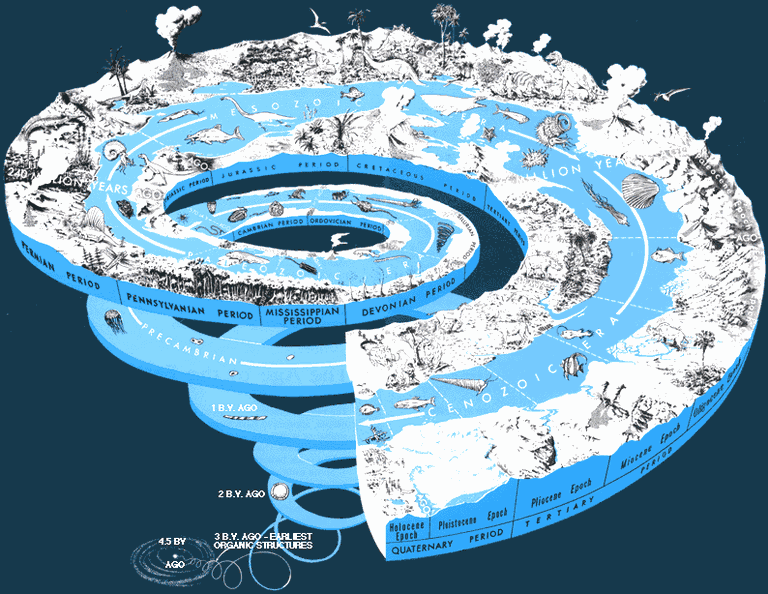
How do you deal with uncertainty and rapid change in your environment? You adapt, because every generation of your ancestors, going back to the beginning of life, has successfully adapted to change. And that is you, here in 2020. Today, our social and physical environments are changing so rapidly that we are almost constantly forced to adapt… and to strive to maintain a stable mind despite an unstable environment. How have you learned to stay calm during this tumultuous year?
If we take a long view of Earth’s evolution, it is reasonable to expect change. Animals have been evolving on this planet for about 800 million years, mammals for about 200 million, and primates for about 50 million. The genus Homo evolved about 2.8 million years ago, and we modern Homo sapiens (Latin for “wise man”) have endured storms, earthquakes, and volcanic eruptions for about 300,000 years. That means we “wise men” have more than 300,000 years of relocating when the landscape became uninhabitable and adapting to the ever-changing environment on which we are entirely dependent. All living organisms that exist today are the result of more than 3.8 billion years of adaptation and evolution. We are the heirs of countless generations of survivors who have weathered unimaginable odds and continued to breathe, find food, and change to pass on our genes and continue our traditions. Life cannot survive unless it adapts to a changing environment, and the faster the environment changes, the more adaptive life must be.

This year, I’ve been thinking about how we adapt to the changes we face in our modern age. I’ve been using modern scientific knowledge about what makes humans happy, stable, healthy, and well-adjusted. There is direct evidence that some people are able to live in uncomfortable or even painful situations and truly appreciate their lives and experiences. What is it about their perspective that allows them to adapt to an ever-changing social and physical environment and maintain their happiness? Scientific research points to physical health, lack of attachment to outcomes, and strong social bonds as traits associated with this grateful response to unexpected, life-changing losses..

Yogis embody this view and response to the changing world we live in. Yogis know that change is an inevitable consequence of the inexorable flow of time. They choose to flow with time, not become attached to the outcome of any situation, move their bodies in rhythm close to their breath, and develop strong connections with themselves and others. Yoga’s roots date back over 5000 years and originally focused on meditation and environmental awareness. Yoga, like everything else, has evolved. More recently, it has evolved into group classes in gyms and studios with a focus on fitness. As a form of fitness, Yoga is great for improving strength and flexibilityBut yoga, taught with mindfulness steeped in 5,000 years of practice, helps stabilize the mind, increase flexibility and adaptability, and become aware of the environment both inside and outside the human body.

Homo sapiens has been around for about 315,000 years, yoga has been practiced by “sages” for about 5,000 years, and today in 2020, we need to remember that we are the result of billions of years of a lineage of successful organisms that have survived unimaginable conditions by adapting to ever-changing environments. We are adaptable and yoga is one of those legacies of thought on how to develop consciousness and peacefully adapt to the way life unfolds. Homo sapiens has accumulated knowledge about the environment we depend on so that we can more accurately predict natural phenomena, and we call this science. Science is one of our heritage of thinking about how we develop knowledge about how our environment and the world evolves and how we can best adapt to ongoing change.Through medicine and geoscience, we have become aware of our internal and external environments. We have more data about our environment than ever before in human history. We know about asteroids orbiting Earth, the changing composition of the planet’s atmosphere, the evolution of viruses, how to treat disease, we can predict storms and evacuate before they approach land, and we can build tools to promote or destroy environmental stability. Individual and community levels We can choose to build strength and flexibility in body and mind, support compassionate and honest relationships, and embody over 5000 years of knowledge about how to evolve with time and change.
Everything that exists has adapted to the unexpected. Think about how much you have changed since March 2020. How do you find a sense of personal stability, knowing that some things can be changed and some things cannot? Change is inevitable, you choose how you want to change.

